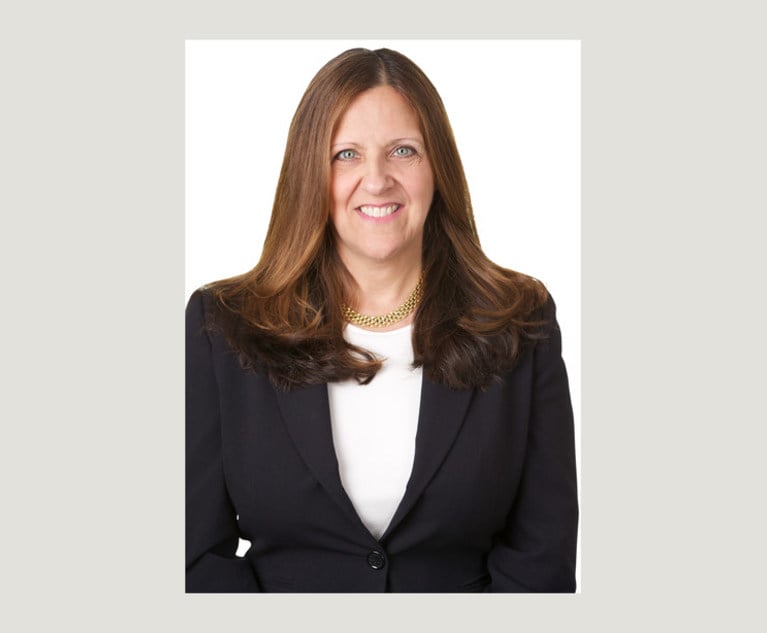 Photo: Bigstock
Photo: BigstockSupreme Court Hears Arguments Over Voided Retainer in Fee-Shifting Case
The New Jersey Supreme Court heard oral arguments over whether lawyers in certain fee-shifting cases must inform clients about other attorneys who may be able to represent them for less money.
October 28, 2019 at 10:00 AM
6 minute read
The New Jersey Supreme Court heard oral arguments over whether lawyers in certain fee-shifting cases must inform clients about other attorneys who may be able to represent them for less money.
In Balducci v. Cige, a paralegal named Lisa Balducci retained attorney Brian Cige in 2012 to represent her in a suit on behalf of her minor son involving a claim under the Law Against Discrimination, which provides fee-shifting for prevailing plaintiffs.
After Balducci terminated Cige as her counsel and hired another lawyer, Cige presented her with a bill for $286,746 in fees and expenses, according to court documents.
In 2016, Balducci filed a declaratory judgment action seeking to have the retainer agreement voided. Somerset County Superior Court Judge Yolanda Ciccone said the agreement was unenforceable. An Appellate Division panel—Judges William Nugent, Carmen Alvarez and Richard Geiger—agreed.
The appeals courts, in affirming the trial court's decision, said the retainer was void because Cige, a Somerville solo, failed to inform Balducci that he would be charging hourly fees in addition to contingency.
Last March, the Supreme Court agreed to hear Cige's appeal.
"I felt like I was double-teamed," Cige, arguing on his own behalf at the Supreme Court on Oct. 24, told the justices, speaking about the trial court and appellate rulings. He was the first to present arguments before the court. "False testimony was given by Ms. Balducci. Things weren't addressed by the Appellate Division, such as questions raised over expenses I itemized on the retainer agreement."
Cige proceeded to speak about his difficulties in the case, which he said he worked on for three years. He was asked more than once to move on by Chief Justice Stuart Rabner.
"In the interest of time, you need to tell us, respectfully, the real issue here that you want us to consider," Rabner said, again prodding Cige to move forward minutes later.
Cige said the appeals court's invalidation of the retainer imposes a new rule on lawyers who charge hourly fees for working on discrimination or other fee-shifting cases.
"I believe there was a bias in the finding of the trial court," Cige said. "I believe the [Appellate Division] overreached. I stuck by my [retainer] agreement. There were never issues with the agreement until the plaintiff wanted new counsel."
Cige added that the Appellate Division ruling "leaves us in a situation where a client who has an hourly agreement decides, 'I am not going to pay it,' and I think it is fundamentally unfair."
Justice Barry Albin said the Appellate Division relied on the trial court's finding that Balducci was credible.
"We are not credibility finders here. I am trying to figure out how you surmount that," Albin said.
Appearing as amicus curiae to question whether the Appellate Court over-reached were the New Jersey State Bar Association, the National Employment Lawyers Association of New Jersey and the New Jersey Association for Justice.
The Appellate Division's published opinion in August 2018 held that lawyers who wish to charge hourly fees in fee-shifting cases must inform their clients that other counsel would be willing to accept such cases on a pure contingency basis and willing to advance any litigation costs. The panel said a lawyer undertaking an LAD case whose agreement includes an hourly component is obligated to explain to the client "both the consequences on a recovery and the ability of other competent counsel likely willing to undertake the same representation based on a fee without an hourly component," Nugent wrote in the opinion. "There is no dearth of competent, civic-minded attorneys willing to litigate LAD and other statutory fee-shifting cases under fee agreements that do not include an hourly component," added Nugent.
On Oct. 24 before the Supreme Court, Edward Zohn argued on behalf of the State Bar Association that the Appellate Division ruling "went far further than needed to decide the case" and then "engaged in improper rule-making" by creating a statewide precedent with binding effect on New Jersey attorneys.
The Appellate Division's decision "will have a substantial impact on lawyers who practice in solo and small firms, as they are often on the front line of advocating for clients in fee-shifting cases, including discrimination matters, consumer fraud and many others," Zohn told the court.
Rabner asked, "Should the rule be completely off?
Zohn said attorneys are prohibited by Rule of Professional Conduct 1.6 from sharing confidential information about their cases, which makes it difficult to compare cases and their degree of complexity with other counsel.
"We can recommend to clients there are other possibilities," Zohn said.
"But the rule is written in such a way as if almost the attorney has to recommend another attorney to the client. We should not impose seemingly new requirements well beyond R.P.C. 1.5," which governs attorney fees, Zohn said. "This went far beyond that."
Justice Faustino Fernandez-Vina asked Richard Schall, arguing on behalf of the National Employment Lawyers Association, an amicus, if an attorney has an obligation to tell a client that a case is going to be more difficult and protracted—and thus more expensive—than expected.
The Appellate Division is "not asking you to predict the outcome. All they are saying is if the case is becoming more complex, you should tell the client that," Fernandez-Vina said. "That is all they are asking you to do."
Schall responded, "The concern is whether we should be referring cases to other attorneys who take only on contingency fee. They are not necessarily the most qualified."
Benjamin Folkman, arguing on behalf of the New Jersey Association for Justice, the state's principal plaintiffs bar group, took questions from the justices regarding client-attorney fee arrangements. He stated the Appellate Division was correct in voiding Cige's fee agreement, though he requested that the Appellate Division's decision be limited to the facts of that matter, and that the dicta concerning fee agreements in general not be adopted by the Supreme Court.
When his turn came up, Jay Rice of Nagel Rice in Roseland, on behalf of Balducci, said whether the Appellate Division went too far as far as rule making wasn't the issue the justices were being asked to weigh.
"The trial court's ultimate decision should be sustained regardless what this court decides to do with rule making," said Rice in his argument.
"The fee agreement that Mr. Cige attempted to enforce on my client was unenforceable, and the trial court agreed with that," Rice said.
"If you are going to have an hourly component, then you should tell the client and give them an idea of what the case might cost," added Rice. "Tell the client: If you go to trial and lose, you will have a substantial hourly bill."
This content has been archived. It is available through our partners, LexisNexis® and Bloomberg Law.
To view this content, please continue to their sites.
Not a Lexis Subscriber?
Subscribe Now
Not a Bloomberg Law Subscriber?
Subscribe Now
NOT FOR REPRINT
© 2024 ALM Global, LLC, All Rights Reserved. Request academic re-use from www.copyright.com. All other uses, submit a request to [email protected]. For more information visit Asset & Logo Licensing.
You Might Like
View All
For Lawyers, the 'Work' of Making an Impact Does Not Have to Happen in a Courtroom. Laura E. Sedlak Says

Doing the Right Thing in the Pursuit of Justice Requires Guts, Says Lyndsay Ruotolo

One Can be Most Impactful When Their Pursuits Are Driven by Their Concerns and Passions, Says Sherilyn Pastor

As a Lawyer, You Have a Powerful Way to Make an Impact, Says Mary Frances Palisano
Trending Stories
- 1Call for Nominations: Elite Trial Lawyers 2025
- 2Senate Judiciary Dems Release Report on Supreme Court Ethics
- 3Senate Confirms Last 2 of Biden's California Judicial Nominees
- 4Morrison & Foerster Doles Out Year-End and Special Bonuses, Raises Base Compensation for Associates
- 5Tom Girardi to Surrender to Federal Authorities on Jan. 7
Who Got The Work
Michael G. Bongiorno, Andrew Scott Dulberg and Elizabeth E. Driscoll from Wilmer Cutler Pickering Hale and Dorr have stepped in to represent Symbotic Inc., an A.I.-enabled technology platform that focuses on increasing supply chain efficiency, and other defendants in a pending shareholder derivative lawsuit. The case, filed Oct. 2 in Massachusetts District Court by the Brown Law Firm on behalf of Stephen Austen, accuses certain officers and directors of misleading investors in regard to Symbotic's potential for margin growth by failing to disclose that the company was not equipped to timely deploy its systems or manage expenses through project delays. The case, assigned to U.S. District Judge Nathaniel M. Gorton, is 1:24-cv-12522, Austen v. Cohen et al.
Who Got The Work
Edmund Polubinski and Marie Killmond of Davis Polk & Wardwell have entered appearances for data platform software development company MongoDB and other defendants in a pending shareholder derivative lawsuit. The action, filed Oct. 7 in New York Southern District Court by the Brown Law Firm, accuses the company's directors and/or officers of falsely expressing confidence in the company’s restructuring of its sales incentive plan and downplaying the severity of decreases in its upfront commitments. The case is 1:24-cv-07594, Roy v. Ittycheria et al.
Who Got The Work
Amy O. Bruchs and Kurt F. Ellison of Michael Best & Friedrich have entered appearances for Epic Systems Corp. in a pending employment discrimination lawsuit. The suit was filed Sept. 7 in Wisconsin Western District Court by Levine Eisberner LLC and Siri & Glimstad on behalf of a project manager who claims that he was wrongfully terminated after applying for a religious exemption to the defendant's COVID-19 vaccine mandate. The case, assigned to U.S. Magistrate Judge Anita Marie Boor, is 3:24-cv-00630, Secker, Nathan v. Epic Systems Corporation.
Who Got The Work
David X. Sullivan, Thomas J. Finn and Gregory A. Hall from McCarter & English have entered appearances for Sunrun Installation Services in a pending civil rights lawsuit. The complaint was filed Sept. 4 in Connecticut District Court by attorney Robert M. Berke on behalf of former employee George Edward Steins, who was arrested and charged with employing an unregistered home improvement salesperson. The complaint alleges that had Sunrun informed the Connecticut Department of Consumer Protection that the plaintiff's employment had ended in 2017 and that he no longer held Sunrun's home improvement contractor license, he would not have been hit with charges, which were dismissed in May 2024. The case, assigned to U.S. District Judge Jeffrey A. Meyer, is 3:24-cv-01423, Steins v. Sunrun, Inc. et al.
Who Got The Work
Greenberg Traurig shareholder Joshua L. Raskin has entered an appearance for boohoo.com UK Ltd. in a pending patent infringement lawsuit. The suit, filed Sept. 3 in Texas Eastern District Court by Rozier Hardt McDonough on behalf of Alto Dynamics, asserts five patents related to an online shopping platform. The case, assigned to U.S. District Judge Rodney Gilstrap, is 2:24-cv-00719, Alto Dynamics, LLC v. boohoo.com UK Limited.
Featured Firms
Law Offices of Gary Martin Hays & Associates, P.C.
(470) 294-1674
Law Offices of Mark E. Salomone
(857) 444-6468
Smith & Hassler
(713) 739-1250






